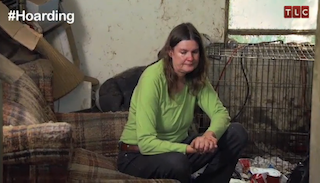
I admit, I wouldn’t have predicted its popularity. But of course, the show isn’t really about clutter. Like other shows in the “rehabilitation” genre, “Hoarding” is about transformation.
From despair to redemption. From dirty to pure. From helpless to empowered.
It’s a modern spin on the hero’s journey, and it may be a perfect model for your AdWords campaign. If your prospects are searching because they have a problem that they’ve so far been unable to solve, you can structure your ads and landing pages based on the Hoarding template.
The Ad as Teaser
“Hoarding” advertises upcoming episodes with stories. And stories are all about conflict. No conflict, no story. Some examples:
- “Tonight, you’ll meet Maggie who is putting her son’s life at risk with her massive collections.”
- “Power Stones and Cockroaches: A very upset Sherry talks about her Wiccan powers with an organizer.”
- “Co-worker Visit: Miranda’s colleague is shocked to see her house for the first time.”
Notice the emotionally heightened language: “son’s life at risk… very upset… shocked…”
Each of these short teasers is a premise of a story. Our human brains are hardwired to want to know what happens next, and how it all turns out. Your AdWords ads can function in much the same way as teasers, and will stand out from all the boring ads that focus just on features and benefits.
If you sell landscaping services locally, your competitors will be saying things like this:
- “Weekly maintenance programs, clean up mulching, pruning, leaf removal etc.”
- “Plan, Design or Restore Your Garden. Get Landscaper Reviews & Free Bids.”
- “Creating outdoor environments that renew your spirit-30 yrs experience.”
(I just copied and pasted those quotes straight from a Google search for [landscaping durham nc]).
The first ad represents a straight list of features.
The second ad is slightly better, highlighting an outcome and sharing an offer.
The third ad goes for the higher-level benefit (“renew your spirit”), which theoretically I should approve of as an empathetic approach. But somehow it falls flat in the context of a search ad on the keyword “landscaping Durham NC.”
A teaser ad, by contrast, promises a story rife with conflict and high stakes. For example:
- The lawn company’s chemicals made her children sick.
- Cheryl wallowed in self-pity: “I can’t even grow dandelions.”
- “Can’t play ball, son. I’ve got to mow again.”
- Harry gazed as his neighbor’s yard in envy and shame.
In order to write a teaser ad, you have to get clear on the deepest pain that triggered the search. Why does someone really want landscaping? Each of the above teaser ads aims at a different motivator, and triggers a different emotional response.
The Landing Page as Episode
All “Hoarding” episodes follow the same formula:
- Introduce the likeable hero
- Show the problem (their hoarding behavior and their home)
- Agitate the problem by showing how shocking and unbearable it is
- Turbo-agitate the problem by showing how it affects other people that the hero cares about
- Show the crisis that triggers the call to change
- Meeting with the mentors (the psychologist who treats the disorder generally follows the magician archetype, while the professional organizer who clears the clutter is of the alchemist variety)
- The hero gets to work, finally with the support they need
- Challenges and setbacks
- Success (or failure, but usually success, including a montage of before and after shots of the home)
- Testimonials (interviews with the hero and their friends and family)Call to action outro screen – apply to be on an upcoming show
Your landing page can borrow this entire outline. You can write in the second person (“So, you’re a homeowner who wants to do right by your yard”) or tell a third-party story (“Meet Cheryl, who just bought her first house and really wants to make her yard something special.”)
In either case, the real subject of the story is your prospect, either directly or through identification. That’s why it’s so important to make your hero likeable, even though they may be deeply flawed.
So here’s how the landing page outline could go:
- Meet Cheryl and Joe, who just bought their first house and want to create a vegetable garden in their side yard, to inspire and feed their kids.
- Everything they plant withers and dies.
- Cheryl feels like crying every times she goes outside or looks out the window.
- They neighbors, with their tidy green lawns, give her dirty looks and mutter about “falling property values.” She complains to Joe that he isn’t spending enough time helping her. Tension builds in the home.
- Finally, Cheryl orders a soil test and discovered diazinon, malathion, and lead in the soil.
- Shocked into action, she call in Bountiful Backyards landscaping company.
- The landscaper comes over and shows Cheryl and Joe how to bio-remediate the soil using Japanese Knotweed and Salt Cedar plants.
- Skip “Challenges and Setbacks” for now.
- Cheryl and Joe now grow dozens of fruits, nuts and vegetables in healthy soil. The neighbors all want to know how they did it. The couple and their children are happy and healthy.
- Testimonials from Cheryl and Joe and dozens of other clients.
- Call to Action – you can be Bountiful Backyard’s next success story.
- Return to Challenges and Setbacks in the form of Objections Raised and Answered.
- Repeat the Call to Action.
The foundation of this style of search advertising is deep empathy with your prospect. If you tell their story and highlight what matters to them, you’ll command their attention and stoke their hunger for transformation.